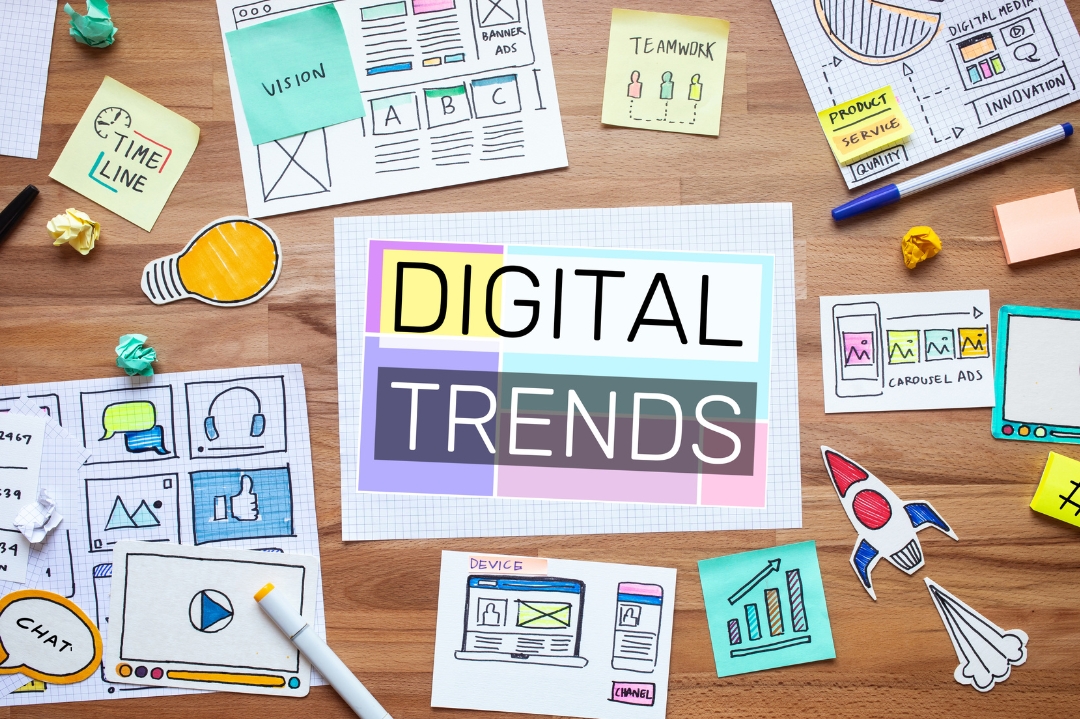As we approach 2025, the digital marketing landscape continues to evolve at an unprecedented pace. Technological advancements, changes in consumer behavior, and the emergence of new platforms are shaping the future of how brands connect with their audiences. Staying ahead of these trends is essential for businesses aiming to maintain a competitive edge. Below, we explore the top 10 digital marketing trends that are set to dominate in 2025.
1. AI-Driven Marketing
Artificial Intelligence (AI) continues to revolutionize digital marketing by providing highly personalized and efficient solutions. In 2025, AI will play a central role in:
- Predictive analytics for understanding consumer behavior.
- Personalization at scale, creating unique experiences for users based on their preferences.
- Automated customer service through AI-powered chatbots.
- Content creation and optimization using tools like ChatGPT and Jasper.
Marketers leveraging AI will be able to provide hyper-relevant recommendations, enhance customer experiences, and optimize campaigns in real time.
2. Voice Search Optimization
With the proliferation of smart speakers and voice assistants like Alexa, Siri, and Google Assistant, voice search is becoming a significant channel for content discovery. By 2025:
- More than 50% of online searches are expected to be voice-based.
- Conversational and long-tail keywords will become essential for SEO strategies.
- Brands will need to optimize for local voice searches, as users often seek nearby services using voice commands.
Ensuring your content is optimized for natural language queries will be key to staying relevant in voice search results.
3. Immersive Experiences Through AR and VR
Augmented Reality (AR) and Virtual Reality (VR) are transforming how consumers interact with brands. By 2025:
- AR will dominate in e-commerce, allowing users to virtually try on products such as clothes, glasses, or makeup before purchasing.
- VR will be increasingly used for immersive brand storytelling and virtual showrooms.
- Industries such as real estate, automotive, and travel will use AR/VR to offer virtual tours and experiences.
Investing in AR/VR will allow brands to engage audiences in unique and memorable ways, driving conversions and customer loyalty.
4. Sustainability-Focused Marketing
Consumers in 2025 are expected to demand greater transparency and accountability from brands regarding their environmental impact. Sustainability-focused marketing will:
- Highlight eco-friendly practices and sustainable product lines.
- Use storytelling to connect emotionally with environmentally conscious consumers.
- Leverage certifications and partnerships to build credibility.
Brands that align with sustainability values will not only attract but retain socially aware customers.
5. Influencer Marketing 2.0
Influencer marketing is maturing into a more sophisticated channel. By 2025:
- Micro and nano influencers will gain prominence due to their higher engagement rates and niche audiences.
- AI tools will help brands identify the best-fit influencers for their campaigns.
- Influencer-led live shopping events will drive real-time sales.
Brands will need to forge authentic relationships with influencers to ensure their messaging resonates with target audiences.
6. Social Commerce and Live Shopping
Social media platforms are becoming integral to the shopping experience. By 2025:
- Social commerce will be fully integrated into platforms like Instagram, TikTok, and Pinterest, allowing users to purchase products without leaving the app.
- Live shopping events, akin to QVC-style broadcasts, will become a mainstream way to showcase products and engage with consumers.
- Shoppable videos and posts will drive impulse buying.
To succeed, brands must create engaging, interactive, and seamless shopping experiences on social media.
7. The Rise of Zero-Party Data
As privacy regulations tighten and third-party cookies phase out, zero-party data will become crucial. Zero-party data refers to information customers willingly share with brands, such as:
- Preferences, interests, and feedback collected through surveys, quizzes, or subscriptions.
- Customization preferences for personalized experiences.
In 2025, brands that excel at building trust and encouraging customers to share data will be able to craft more effective and ethical marketing campaigns.
8. Short-Form Video Dominance
Short-form video content will remain a dominant force in digital marketing. Platforms like TikTok, Instagram Reels, and YouTube Shorts will continue to grow in popularity. Key trends include:
- Storytelling in 15–60 seconds to capture user attention quickly.
- User-generated content to build authenticity and trust.
- Integration of video content with social commerce.
Marketers must focus on creativity and storytelling to make their short-form videos stand out.
9. Interactive and Gamified Content
Consumers increasingly seek engaging and interactive online experiences. Gamification in marketing will take center stage in 2025, with brands using:
- Quizzes, polls, and surveys to engage audiences.
- Games and challenges with rewards to drive participation and brand loyalty.
- Interactive infographics and clickable elements in blogs or landing pages.
Such content not only entertains but also encourages active participation, boosting user engagement and retention.
10. Metaverse Marketing
The metaverse represents a virtual realm where users interact through avatars in immersive environments. By 2025:
- Brands will host virtual events, product launches, and experiences in the metaverse.
- Digital goods and NFTs will become integral to marketing campaigns.
- Early adopters in industries such as fashion, gaming, and entertainment will lead the charge.
The metaverse offers brands an opportunity to connect with younger, tech-savvy audiences in innovative ways.
The future of digital marketing in 2025 is driven by technological advancements and an ever-evolving consumer landscape. To stay competitive, brands must embrace AI, optimize for voice and video, leverage immersive technologies like AR/VR, and focus on ethical, data-driven strategies. By keeping up with these trends, businesses can position themselves for success in an increasingly digital-first world.






